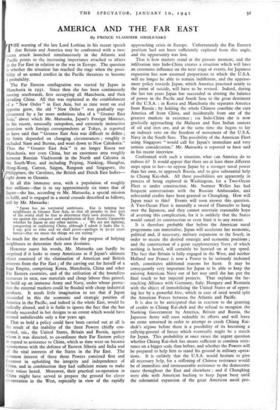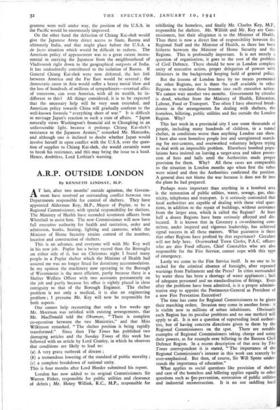AMERICA AND THE FAR EAST
By PRINCE VLADIMIR OBOLENSKY
HE warning of the late Lord Lothian in his recent speech that Britain and America may be confronted with a two- ocean attack launched simultaneously in the Atlantic and Pacific points to the increasing importance attached to affairs in the Far East in relation to the war in Europe. The question is whether the situation has reached the stage when the possi- bility of an armed conflict in the Pacific threatens to become a probability.
The Far Eastern conflagration was started by Japan in Manchuria in 1931. Since then she has been continuously moving southwards, first occupying all Manchuria, and then invading China. All that was explained as the establishment of a " New Order " in East Asia, but as time went on and appetite grew, the old " New Order " was gradually sup- plemented by a far more ambitious idea of a " Greater East Asia," about which Mr. Matsuoka, Japan's Foreign Minister, in his recent, unusually outspoken, and extremely instructive interview with foreign correspondents at Tokyo, is reported to have said that " Greater East Asia was difficult to define ; its limits depended on changing circumstances ; roughly it included Siam and Burma, and went down to New Caledonia." Thus the " Greater East Asia " is no longer Korea nor Manchuria, nor even China, but an enormous area roughly between Russian Vladivostok in the North and Calcutta in the South-West, and including Peiping, Nanking, Shanghai, Hong-Kong, Canton, Saigon, Rangoon and Singapore, the Philippines, the Carolines, the British and Dutch East Indies— right down to Oceania.
In all this immense area, with a population of roughly 600 millions—that is to say approximately six times that of Japan—she has, according to Mr. Matsuoka, a special mission to fulfil, and is engaged in a moral crusade described as follows, still by Mr. Matsuoka :
" Japan has no territorial ambitions. She is helping her neighbours in Greater East Asia, so that all peoples in that part of the world shall be free to determine their own destinies. We are against the conquest and exploitation of East Asiatic Countras whether by Japan or any other nation. . . . We are not fighting, conquering or exploiting China, although I admit it looks like it. I say, give us time and we shall prove—perhaps in 30-50 years hence—that we mean the things we are saying."
So much for the method selected for the purpose of helping neighbours to determine their own destinies.
However suave his words, Mr. Matsuoka can hardly be surprised if it looks to many Americans as if Japan's ultimate object consisted of the elimination of American and British interests from the Far East ; of the carving out for herself of a huge Empire, comprising Korea, Manchuria, China and other Far Eastern countries, and of the utilisation of the boundless resources in men, raw materials and cheap labour thus gained, to build up an immense Army and Navy, under whose protec- tion the external markets could be flooded with cheap industrial products. It needs little imagination to see that if Japan succeeded in' this the economic and strategic position of America in the Pacific, and indeed in the whole East, would be radically altered, and it is futile to ignore the fact that she has already succeeded in her designs to an extent which would have seemed unbelievable only a few years ago.
That so bold a policy could have been carried out at all is the result of the inability of the three Powers chiefly con- cerned, viz., the United States, Britain and Russia, against whom it was directed, to co-ordinate their Far Eastern policy in regard to assistance to China, which as time went on became synonymous with the defence of Eastern Siberia and India and of the vital interests of the States in the Far East. The common interest of these three Powers consisted first and foremost in upholding the integrity and independence of China, and in combination they had sufficient means to make their voices heard. Moreover, their practical co-operation in China might have served to prepare the ground for closer co-operation in the West, especially in view of the rapidly approaching crisis in Europe. Unfortunately the Far Eastern problem had not been sufficiently explored from this angle, and the opportunity was lost.
That is how matters stand at the present moment, and the infiltration into Indo-China creates a situation which will have an enormous influence on the next stage of events, for Japanese expansion has now assumed proportions to which the U.S.A. will no longer be able to remain indifferent, and the appease- ment policy towards Japan, which America practised nearly to the point of suicide, will have to be revised. Indeed, during the last ten years Japan has succeeded in altering the balance of power in the Pacific and South Seas to the great detriment of the U.S.A. ; in Korea and Manchuria she separates America from Russia ; by holding the whole Chinese coastline she cuts America off from China, and incidentally from one of the greatest markets in existence ; via Indo-China she is now gradually approaching the Malayan and East Indian sources of oil and iron ore, and at the same time she begins to lay an indirect veto on the freedom of movement of the U.S.A. Navy in the South Seas. The possibility of the American Fleet using Singapore " would call for Japan's immediate and very serious consideration," Mr. Matsuoka is reported to have said in his recent interview.
Confronted with such a situation, what can America do to redress it? It would appear that there are at least three different steps open to her—to oppose Japan by a stronger naval power than her own, to approach Russia, and to give substantial help to Chiang Kai-shek. All these possibilities are apparently in process of being explored in Washington, for a Two-Ocean Fleet is under construction, Mr. Sumner Welles has had frequent conversations with the Russian Ambassador, and substantial credits have been granted to Chungking. How will Japan react to this? Events will soon answer this question. A Two-Ocean Fleet is naturally a sword of Damocles to hang over the Japanese, and they cannot entertain reasonable hope of averting this complication, for it is unlikely that the States would cancel its construction or even limit it to any extent.
It is therefore probable that before the American naval programme can materialise, Japan will accelerate her economic, political and, if necessary, military expansion to the South, in order to secure the desired strategic and economic positions ; and the construction of a great supplementary Navy, of which nothing is heard, will certainly be hurried on at top speed.
The fact that Britain is fully engaged in the West, and neither Holland nor France is now a Power to be seriously reckoned with, constitutes additional reasons for haste. It may be consequently very important for Japan to be able to keep the existing American Navy out of her way until she has put the final touch to her imperial projects. That explains the far- reaching Alliance with Germany, Italy, Hungary and Rumania with the object of immobilising the United States or of oppos- ing her by a powerful bloc, which in case of need would split the American Forces between the Atlantic and Pacific.
It is also to be anticipated that in reaction to the granting of credits to Chiang Kai-shek and the refusal to recognise the Nanking Government by America, Britain and Russia, the Japanese Army will soon redouble its efforts and will leave no stone unturned in order to attempt to crush Chiang Kai- shek's regime before there is a possibility of its becoming a rallying-ground of forces which eventually might be a match for Japan. This probability at once raises the urgent question whether Chiang Kai-shek has means sufficient to continue resis- tance on a bigger scale than before, and whether the Powers will be prepared to help him to stand his ground in military opera- tions. It is unlikely that the U.S.A. would hesitate to give all necessary help, for a stiffening of Chinese resistance would be of immediate and immeasurable assistance to the democratic cause throughout the East and elsewhere ; and if Chungking were able with American backing to keep Japan busy until the substantial expansion of the great American naval pro- gramme were well under way, the position of the U.S.A. in the Pacific would be enormously improved.
On the other hand the defection of Chiang Kai-shek would give the Japanese Army direct access to Siam, Burma and ultimately India, and that might place before the U.S.A. a de facto situation which would be difficult to redress. The American policy of appeasement was to a great extent instru- mental in carrying the Japanese from the neighbourhood of Vladivostok right down to the geographical outposts of India. It has undoubtedly contributed to the isolation of Russia. If General Chiang Kai-shek were now defeated, the last link between America and the Far East would be severed ; the democratic cause in Asia would suffer a heavy moral blow and the loss of hundreds of millions of sympathisers—eventual allies of tomorrow, can even America, with all its wealth, be in- different to this? All things considered, it is to be expected that the necessary help will be very soon extended, and American policy towards China will gradually conform to the well-known formula " everything short of war." It is difficult to envisage Japan's reaction to such a state of affairs. " Japan naturally views Washington's financial aid to Chungking in an unfavourable light, because it prolongs Chiang Kai-shek's resistance to the Japanese Armies," remarked Mr. Matsuoka, and although one is inclined to doubt whether Japan would involve herself in open conflict with the U.S.A. over the ques- tion of supplies to Chiang Kai-shek, she would certainly want to break his resistance, and this may bring the issue to a head. Hence, doubtless, Lord Lothian's warning.



























 Previous page
Previous page